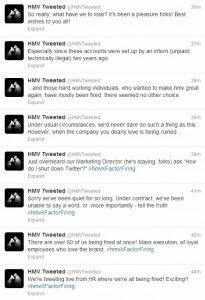Organisations have fully embraced social media as a marketing & PR tool; it’s an ideal way to interact with the public, much cheaper than traditional media advertising and arguably much more effective. However, social media brings potential PR disasters for everyone from the biggest multinationals to the smallest local businesses.
In larger organisations it’s often the case that social media is overlooked by management, treated as a minor part of marketing strategy and delegated to junior members of staff who are generally more familiar with the platform. This approach has its dangers as HMV staff (who were being made redundant) recently demonstrated.
These tweets were an immediate viral sensation and were quickly picked up by mainstream media outlets who gleefully reported the story even as new messages kept appearing. Eventually HMV’s senior management seem to have regained control and deleted the unsanctioned tweets, but not before the whole episode was immortalised in the press and in internet culture.
The lesson here is clear: keep a close eye on your social media channels, and if you’re going to give staff access to update them, keep those staff happy (or at least change the passwords when you sack them)!
The immediacy of social media and the tendency of the internet to act as an archive which highlights blunders mean that when a mistake is made it’s usually impossible to delete it, or to sweep the whole thing under the carpet; something the online ticket-exchange company Stub Hub learned when this message was tweeted from the company account.
The offending tweet was deleted within the hour and Stub Hub apologised for the language used, but several people had begun spreading screen captured images, and the incident quickly went viral.
It’s not clear whether this was a hack, a disgruntled employee or a personal tweet accidently put on the company account. What is clear is that it’s embarrassingly easy for these mistakes to be made; the trick is dealing with them quickly, honestly and humorously. Social media is a fast-moving, cynical and informal medium; companies need to treat it accordingly.
Unfortunately sometimes there’s no recovering from a gaffe, as the fast food chain McDonalds found out with their ill-conceived hashtag campaign: #McDstories. The company used the hashtag in a paid-for promotional tweet, but Twitter users immediately seized on #McDstories as a vehicle for criticising the chain.
The stream of tweets that followed include anecdotes about users finding unexpected items in their McDonalds food, reminiscences of bouts of food poisoning after visiting a golden arches outlet, allegations about staff rudeness and McDonalds immoral corporate practices, criticisms of hygiene standards as well as complaints about aggressive marketing and fast food causing obesity.
What’s really damaging is that the #McDstories hashtag seems to have lodged in Twitter user’s collective consciousness; to this day (over a year after the initial tweet) you can still find #McDstories tweets attacking the company.
Waitrose supermarkets were another company who found themselves at the wrong end of their own hashtag when an ill-conceived “I shop at Waitrose because _______. #WaitroseReasons” campaign backfired spectacularly.
Users immediately hijacked the promotion to lampoon the Waitrose brand with tweets like:
“I shop at Waitrose because it makes me feel important and I absolutely detest being surrounded by poor people #waitrosereasons”
“I shop at #waitrose because I WILL NOT stand next to the scum bags at Marks and Spencer. #waitrosereasons”
“I shop at Waitrose so people know I’m filthy rich and therefore automatically better than they are #WaitroseReasons”
Both the McDonalds and Waitrose Twitter fails show the potential for disaster when giving the public a platform and inviting them to tell the world what they really think of your brand – you might not like their answers.
Finally there’s the infamous story of the chocolate bar Snickers taking controlling of celebrities Twitter accounts for an advertising campaign. Last year Katie Price (AKA Jordan), Rio Ferdinand, Ian Botham and Cher Lloyd began posting unusual tweets.
Most noticeable was the change in the tweets coming from the account:
Confused users speculated about whether the reality star’s twitter account had been hacked, until it was revealed that the out-of-character messages had been leading up to a tweet revealing that snickers were behind the posts as part of their “You’re not you when you’re hungry” campaign.
If there’s one thing social media users hate, it’s being tricked into engaging with advertising. There were complaints made to the Advertising Standards Authority by angry users who felt deceived. The ASA does have rules against adverts not being clearly identified as marketing/advertising material and promptly started their own investigation.
Eventually that investigation cleared Snickers of breaching the advertising code, so while not as disastrous as it could have, any Twitter ad campaign that irritates users and results in a company being investigated by the industry regulator, can hardly be considered a win.
When it comes to using Twitter and other social media in a professional capacity for your business, the general rule of thumb has to be to respect other users, engage with them intelligently and humorously. Nobody signs up to Twitter just to be advertised at. It’s a conversation, so politely get involved.














Speak Your Mind